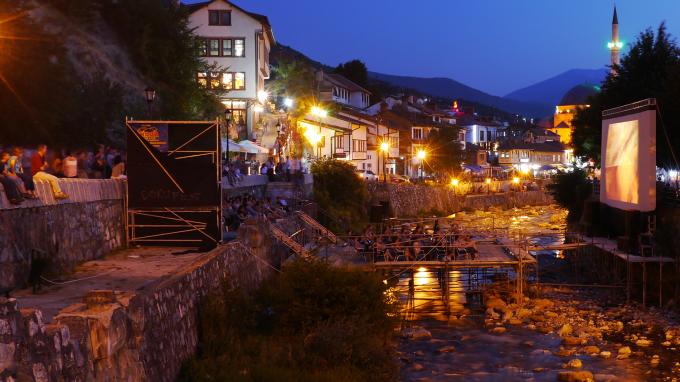
Photo courtesy of Dokufest.

Photo courtesy of Dokufest.
A screening at the opening ceremony of DokuFest 2011 in Prizren, Kosovo.
Prizren
Kosovo
The organizers of DokuFest in Prizren, Kosovo noticed two trends in tension with each other. While a growing number of filmmakers around the world are producing films that tackle environmental issues, local and national authorities demonstrate a distressing lack of concern about the environment. Organizers decided to address both trends by going green.
In 2009, the organizers added a documentary category called “Green DOX” to its annual international documentary and short-film festival, which was already well known for its showcase of works addressing social, political, and human rights issues. Regarded as one of the most influential cultural events in Kosovo, DokuFest organizers believed it could make an impact in the environmental arena.
“We hoped we could help raise the awareness of the Kosovars,” said Aliriza Arënliu, executive director of DokuFest. “As a citizen living in this country I see low priority given to environmental issues—both on the level of policy creation and the implementation of the existing policies.”
As the organizers anticipated, the Green DOX films have generated discussions among festival attendees and the wider community. A lively debate followed the screening of Kingdom of Coal, which investigates the economic, health, and environmental costs of coal and explores the potential for alternative energy in Kosovo. DokuFest also hosted a debate on alternative energy that included panelists such as a representative for the Ministry of Economical Development and the head of a green energy technology company.
An innovative aspect of DokuFest is its involvement in Prizren throughout the year, including weekly screenings and discussions of documentaries. One of its newest projects is the establishment of cinema clubs for students in local high schools, where screenings will include documentaries on environmental issues.
Going beyond promoting green films, DokuFest incorporates sustainability into their organizational practices. The organization plants trees to symbolically offset carbon emissions produced by the film festival. “We educate the public by showing a short video about our tree-planting efforts before each screening. For many young people, this is the first time they hear about carbon footprints,” said Arënliu.
DokuFest also supplies used bicycles as a means of transportation for staff during the weeklong event. “This was a further reinforcement of the existing habits that we observed among the festival staff and volunteers,” said Arënliu. “It worked great, as all festival points can be easily reached with bikes.”
In addition, the festival drew media attention for its generation of electricity via a watermill in the festival camp and solar panels that powered lights in the center of the city. “We hope to show concretely—especially to the local authorities—that alternative energy can be used effectively,” said Arënliu. “We hope that they will continue with our example and substitute all public lights with the ones with solar panels.”
Arënliu recognizes that creating change is never easy, but DokuFest continues its innovative work, planning to be the first carbon-free festival in the Balkans. "We are preparing to accomplish it soon,” Arënliu said. “We will certainly continue our mission of promoting and using as much renewable energy as possible.”
Our online database includes grants made by the Rockefeller Brothers Fund over the past five years.